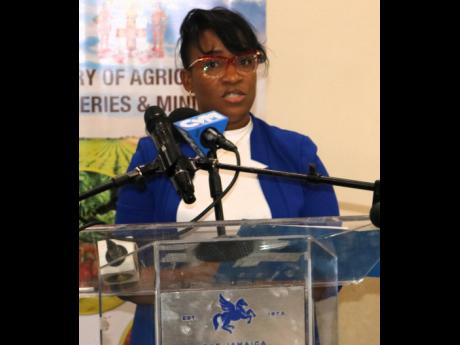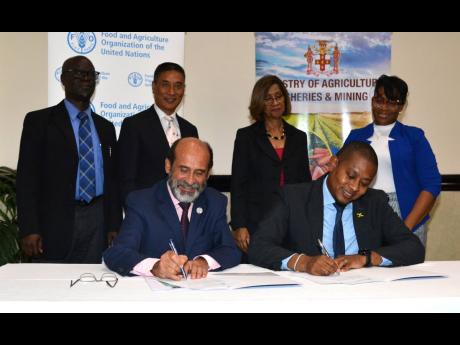Kitson Town farmers looking to avenues for self-sufficiency
THE COMMUNITY of Kitson Town in rural St Catherine is poised for a major socio-economic transformation with the launch of the ‘Improving Rural Livelihoods through Resilient Agrifoods Systems’, which will target at least 150 young people and women between the ages of 15 and 35 for knowledge transfer through skills training and start-up agriculture-related ventures.
Subsistence farming has been the mainstay of the community for decades but National Project Coordinator Princess Lee is optimistic that the introduction of solar-powered equipment to operate greenhouses will, in turn, generate value-added operations such as drying and packaging facilities. She told Tuesday’s launch at The Jamaica Pegasus hotel, New Kingston that solar-powered drip irrigation systems will also play a pivotal role in the empowerment of farmers and, ultimately, the development of their community.
Protective agriculture devices, greenhouses, tunnel houses and shade houses will also be pivotal to the success of the project, along with the introduction of hydroponic and aeroponic farming techniques, Lee explained.
Meanwhile, in welcoming the project, Food and Agriculture Organization (FAO) representative for Jamaica, The Bahamas and Belize, Dr Crispim Moreira, noted that, by introducing climate-resilient agricultural technologies and providing comprehensive entrepreneurship training with access to cutting-edge technology, the project will do much more than enhance the standard of living and boost the household income of participants.
“These beneficiaries will not only learn to adapt to the challenges posed by climate change but also thrive in a rapidly evolving agricultural landscape. The FAO’s strategic pillars of four betters – Better Production, Better Nutrition, Better Environment and Better Life – are strongly reflected in the design of this initiative. This effort will also advance CARICOM’s regional priority to reduce the food import bill by 25 per cent by 2025.”
‘Accelerating Vision 25 by 2025’ is in fact the theme of Caribbean Week of Agriculture, which takes place in The Bahamas from October 9-13.
Dr Moreira described the various technologies to be introduced to the community as not just tools but pathways to prosperity, avenues for self-sufficiency and instruments of empowerment.
“By empowering women with the skills and resources they need, we empower them to become catalysts for rural development. Additionally, focusing on youth is an investment in the future as, by engaging and educating young people in sustainable agriculture not only ensures food security but also cultivates a new generation of environmentally conscious farmers and entrepreneurs. Together, by prioritising these demographics, we not only elevate individual lives but also foster a more inclusive and prosperous society for all.”
High Commissioner of India to Jamaica Masakul Rungsung described the project as not only a symbol of the unfaltering relationship between Jamaica and his country, but also a reflection of the government’s commitment to the need of people at the grassroots level.
He used the occasion to reflect on the life of Mahatma Gandhi, the Indian lawyer, anti-colonial nationalist and political ethicist who employed non-violent resistance to lead the successful campaign for India’s independence from British rule, and whose 154th birthday anniversary was observed the day before.
“The fight of this iconic personality has been social justice, self-reliance, sustainability, skills development and mentorship, not simply for all but specifically for the least. As you take this project forward to address the need for the least of the society, it cannot be a better day to launch this project, as we have been freshly reminded of the life of Mahatma Gandhi and what he stood for.”
The project is being funded by the India-UN Development Partnership Fund, the FAO, and the United Nations Office for South-South Cooperation.


